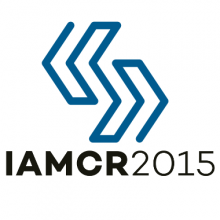
The Political Economy Section looks forward to the next IAMCR Conference and invites submissions (both individual proposals and collective panels) for the 2015 conference to be held at Université du Québec á Montréal (UQAM) in Montreal, Canada, July 12-16, 2015.
Conference theme: “Hegemony or Resistance? The Ambiguous Power of Communication”
See the conference key dates and deadlines: http://iamcr.org/congress/montreal2015-keydates
See all Calls for Papers for IAMCR 2015: http://iamcr.org/congress/montreal2015-cfp
Visit the conference website: http://congresiamcr.uqam.ca
The conference will be held under the general theme "Hegemony or Resistence? The Ambiguos Power of Communication”. This year’s conference theme seeks to explore the ambiguous relationship of communication towards hegemony and resistance. It relates, for example, to the various ways in which communication has been described not only as a value of our times – echoing an ideal for social transparency and communality – but also as a threat in terms of global domination. This ambiguity has prompted debates in academia about communication being at the same time a value and a tool, a space of consent and one of struggle, and having (more authentic) local and global dimensions.The general conference theme is therefore highly relevant for a cross-cutting sections such as Political Economy and the following conference general sub-themes seem particularly relevant for the section:
What are the finalities of communication with regards to opposing forces acting at micro, meso and macro levels? To what extent can media and communication “change our living world”? How can communication contribute to the empowerment of individuals and groups in their local contexts? How do modern forms of communication interact with the ideal of democracy, considered as much an apparatus for manipulation as for freedom? If communication has power, what is the nature of this power? How do media represent hegemonic processes and acts of resistance? In what ways do entertainment, social media, journalism or public relations act as symbols of resistance or control for corporations and civil society? In what ways does media and communication research constitute in itself a site of hegemonic domination or of resistance? Contributions may include empirical research from a wide variety of terrains, or methodological and theoretical papers from a large scope of epistemological perspectives.
In addition to and/or in articulation with the conference sub-themes, the Political Economy Section also welcomes submissions on:
- Political economy of the Internet, social media, telecommunications and mobile communications
- Political economy of audiences,
- Political economy of journalism,
- Political economy of personal information,
- Political economy and feminism
- Political economy and surveillance,
- Moral economies, gift economies and free culture/free economy
- Media capital and financialization of corporate media,
- Public interest and public goods,
- Power, media policy and regulation,
- Media, citizenship and democracy,
- Tracking and analyzing processes of de-commodification or de-marketization in Communications and cultural policies,
- Cultural Industries and diversity
- Cultural and creative labor in the context of digitization and global capitalism,
- Continuing crisis (financial, moral, others),
- Communication experiences of the OccupyWallStreet, Arab Spring and Indignados around the world (Brazil, Hong Kong, Colombia, Malaysia, Greece, Thailand, Mexico, Taiwan, Spain, Turkey etc.) as counter hegemonic social agents.
Aiming to reflect the state of the art, the Section is particularly open to new theoretical approaches and empirical developments.
Guidelines for Abstracts
Abstracts should be 300-500 words in length.
All abstract submissions must be made centrally via the Open Conference System (OCS) at http://iamcr-ocs.org
The Political Economy Section accepts only one paper per author. Proposals should only be proposed to one section or working group.
The section/working group will accept abstracts in English, French or Spanish, but English is preferred to facilitate the international peer review process. We will arrange for presentations in English or Spanish, and for sessions in languages other than English only if the number of qualified proposals warrants it. Please indicate if you would be willing to make your presentation in English if we are unable to accommodate your first choice.
Information
General info on the conference:
For further information on the conference, please consult the Conference Organizers via the conference website at: http://congresiamcr.uqam.ca/
For more information about the Political Economy Section and its plans for the Montreal conference, please contact the coordinating team.
Political Economy Section
Chair:
Rodrigo Gómez, Universidad Autónoma Metropolitana, Mexico
rgomez[at]correo.cua.uam.mx
Vice-Chair:
Peichi-Chung, The Chinese University of Hong Kong
Vice-Chair:
Peter Thompson Victoria University of Wellington, New Zeland
See the conference key dates and deadlines: http://iamcr.org/congress/montreal2015-keydates
See all Calls for Papers for IAMCR 2015: http://iamcr.org/congress/montreal2015-cfp
Visit the conference website: http://congresiamcr.uqam.ca